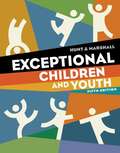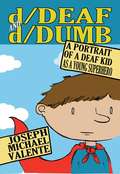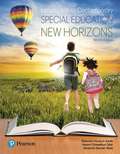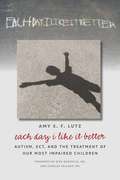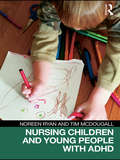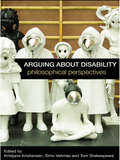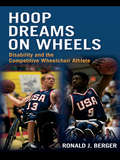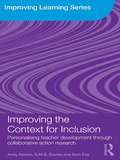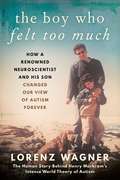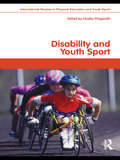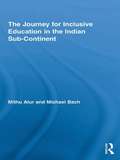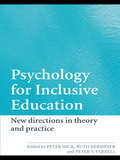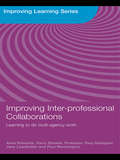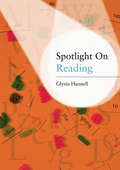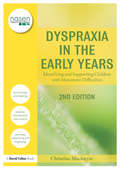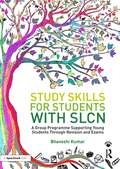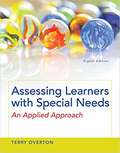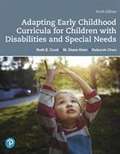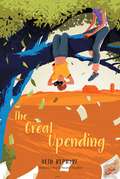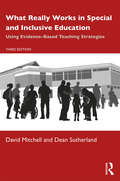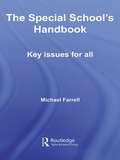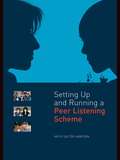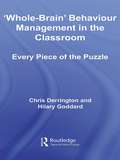- Table View
- List View
Exceptional Children And Youth
by Nancy Hunt Kathleen MarshallEXCEPTIONAL CHILDREN AND YOUTH, Fifth Edition, provides a concise yet complete introduction to special education for pre-service and in-service teachers. One of the most accessible and readable texts available for the Introduction to Special Education course, this new edition is thoroughly updated to reflect the most current information available about special education practice and children with exceptionalities. The text emphasizes current research and theory about exceptional children, human diversity, inclusion, law and social policy, family involvement, real-life stories about exceptionality, and evidence-based teaching practices--all presented in a warm, personal narrative style.
The National Agenda for the Education of Children and Youths with Visual Impairments, Including Those with Multiple Disabilities
by Kathleen M. Huebner Brunhilde Merk-Adam Donna Stryker Karen WolffeWhat the National Agenda Means for Visually Impaired Children, Development of the National Agenda, National Agenda Goal Statements, Importance of the Goal Statements, Strategies for Achieving the Goal Statements, Achievement of the Goal Statements, National Agenda Steering Committee, National Goals and Leader Organizations, Endorsements.
D/deaf And D/dumb: A Portrait Of A Deaf Kid As A Young Superhero (Disability Studies In Education Ser. #10)
by Joseph Valented/Deaf and d/Dumb chronicles the author's dumb, 'deaf kid' origins in Bayport, New York to his current life as a «young superhero» writer. Portraying the conflicting cultural worlds of hearing and Deaf, it describes his life in an in-between underworld and his identity as it alternates between being oppressed and empowered. These feelings are inescapably and forever the reality of those who live on the margins of our larger society.
Introduction to Contemporary Special Education: New Horizons
by Deborah Smith Naomi Tyler Kimberly SkowIntroduction to Contemporary Special Education: New Horizons presents an introduction to the professional practices, trends, and research that define contemporary special education while also conveying the diversity and excitement of this changing field.
Each Day I Like It Better: Autism, ECT, and the Treatment of Our Most Impaired Children
by Amy LutzIn the fall of 2009, Amy Lutz and her husband, Andy, struggled with one of the worst decisions parents could possibly face: whether they could safely keep their autistic ten-year-old son, Jonah, at home any longer. Multiple medication trials, a long procession of behavior modification strategies, and even an almost year-long hospitalization had all failed to control his violent rages. Desperate to stop the attacks that endangered family members, caregivers, and even Jonah himself, Amy and Andy decided to try the controversial procedure of electroconvulsive therapy or ECT. Over the last three years, Jonah has received 136 treatments. His aggression has greatly diminished, and for the first time Jonah, now fourteen, is moving to a less restricted school. Each Day I Like It Better recounts the journeys of Jonah and seven other children and their families (interviewed by the author) in their quests for appropriate educational placements and therapeutic interventions. The author describes their varied, but mostly successful, experiences with ECT. A survey of research on pediatric ECT is incorporated into the narrative, and a foreword by child psychiatrist Dirk Dhossche and ECT researcher and practitioner Charles Kellner explains how ECT works, the side effects patients may experience, and its current use in the treatment of autism, catatonia, and violent behavior in children.
Nursing Children and Young People with ADHD
by Noreen Ryan Tim McDougallADHD is one of the most commonly diagnosed behavioural disorders in children and young people. It is a complex and contested condition, with potential causes and treatments in biological, psychological and social domains. This is the first comprehensive text for nurses and other health professionals in this field. Nursing Children and Young People with ADHD explores the evidence, incorporating and expanding on the new NICE guidelines for practice in this area, to provide an essential knowledge base for practice. The text covers: causes, diagnosis, co-morbidity, user and carer perspectives, assessment, treatment and interventions (including those suitable for use in schools), prescribing and the legal background. An invaluable text for pre-registration student nurses on mental health and children branches, this will also be a useful reference work for post-registration nurses and health professionals seeking evidence-based recommendations for practice.
Arguing about Disability: Philosophical Perspectives
by Kristjana Kristiansen Simo Vehmas Tom ShakespeareDisability is a thorny and muddled concept - especially in the field of disability studies - and social accounts contest with more traditional biologically based approaches in highly politicized debates. Sustained theoretical scrutiny has sometimes been lost amongst the controversy and philosophical issues have often been overlooked in favour of the sociological. Arguing about Disability fills that gap by offering analysis and debate concerning the moral nature of institutions, policy and practice, and their significance for disabled people and society. This pioneering collection is divided into three sections covering definitions and theories of disability; disabled people in society and applied ethics. Each contributor – drawn from a wide range of academic backgrounds including disability studies, sociology, psychology, education, philosophy, law and health science – uses a philosophical framework to explore a central issue in disability studies. The issues discussed include personhood, disability as a phenomenon, social justice, discrimination and inclusion. Providing an overview of the intersection of disability studies and philosophical ethics, Arguing about Disability is a truly interdisciplinary undertaking. It will be invaluable for all academics and students with an interest in disability studies or applied ethics, as well as disability activists.
Hoop Dreams on Wheels: Disability and the Competitive Wheelchair Athlete (Sociology Re-Wired)
by Ronald BergerHoop Dreams on Wheels is a life-history study of wheelchair athletes associated with a premier collegiate wheelchair basketball program. The book, which grapples with the intersection of biography and history in society, situates the study in broader context with background on the history and sociology of disability and disability sports. It documents the development and evolution of the basketball program and tells the individual life stories of the athletes, highlighting the formative interpersonal and institutional experiences that influenced their agentive actions and that helped them achieve success in wheelchair sports. It also examines divisions within the disability community that reveal both empowering and disempowering aspects of competitive wheelchair athletics, and it explores some of the complexities and dilemmas of disability identity in contemporary society. The book is intended to be read by a general audience as well as by students in college courses on disability, sports, social problems, deviance, medical sociology and anthropology, and introductory sociology. It also will be of interest to scholars in the sociology of disability, sociology of sports, and medical humanities, as well as life-history researchers and professionals in the fields of physical education, therapeutic recreation, and rehabilitative counseling.
Improving the Context for Inclusion: Personalising Teacher Development through Collaborative Action Research (Improving Learning)
by Andy Howes S.M.B. Davies Sam FoxThis timely book addresses the need for increasing multi-agency capacity in schools, as the success of initiatives such as ‘Every Child Matters’ or ‘personalised learning’ depends on teachers understanding the challenges faced by young people in learning effectively and happily in their school. The authors of this thought-provoking book present and analyse case studies of collaborative action research, illustrating what is needed in practice for teachers to engage with inclusion for the benefit of their pupils and themselves. The essential elements of success with inclusion are revealed, including: the importance of identifying issues that teachers see as relevant; how teachers can achieve meaningful collaboration in addressing the issues; the necessity of paying careful attention to the consequences of the changes that they make; incorporating practical considerations such as critical support from outsiders; the role of facilitators such as educational psychologists in working with groups of teachers to support their development through action research; how to facilitate change through making use of resources that are already available in the education system. Improving the Context for Inclusion is fascinating reading for all students of education, especially those with an interest in inclusion. Teachers, school leaders and those working in education services will gain an invaluable insight in to how to create an inclusive school environment.
The Boy Who Felt Too Much: How a Renowned Neuroscientist and His Son Changed Our View of Autism Forever
by Lorenz WagnerAn International Bestseller, the Story behind Henry Markram&’s Breakthrough Theory about Autism, and How a Family&’s Unconditional Love Led to a Scientific Paradigm Shift Henry Markram is the Elon Musk of neuroscience, the man behind the billion-dollar Blue Brain Project to build a supercomputer model of the brain. He has set the goal of decoding all disturbances of the mind within a generation. This quest is personal for him. The driving force behind his grand ambition has been his son Kai, who has autism. Raising Kai made Henry Markram question all that he thought he knew about neuroscience, and then inspired his groundbreaking research that would upend the conventional wisdom about autism, expressed in his now-famous theory of Intense World Syndrome. When Kai was first diagnosed, his father consulted studies and experts. He knew as much about the human brain as almost anyone but still felt as helpless as any parent confronted with this condition in his child. What&’s more, the scientific consensus that autism was a deficit of empathy didn&’t mesh with Markram&’s experience of his son. He became convinced that the disorder, which has seen a 657 percent increase in diagnoses over the past decade, was fundamentally misunderstood. Bringing his world-class research to bear on the problem, he devised a radical new theory of the disorder: People like Kai don&’t feel too little; they feel too much. Their senses are too delicate for this world.
Disability and Youth Sport (Routledge Studies in Physical Education and Youth Sport)
by Hayley FitzgeraldHow can or does youth sport reconcile what seems to be a fundamental contradiction between understandings of sport and disability? Has youth sport been challenged in anyway? Have alternative views of sport for disabled people been presented? Examining some of the latest research, this book considers the relationship between sport and disability by exploring a range of questions such as these. Disability and Youth Sport further challenges current thinking and therefore serves to stimulate progressive debate in this area. Drawing on a breadth of literature from sports pedagogy, sociology of sport, disability studies, inclusive education, and adapted physical activity, a socially critical dialogue is developed where the voices of young disabled people are central. Topics covered include: researching disability and youth sport inclusion policy towards physical education and youth sport constructions of disability through youth sport the voices of young disabled people the historical context of disability sport With its comprehensive coverage and expert contributors from around the globe, this book is an ideal text for students at all levels with an interest in youth sport, disability studies, or sport policy.
The Journey for Inclusive Education in the Indian Sub-Continent (Routledge Research in Education)
by Mithu Alur Michael BachDespite national and international commitments to Education for All, and the Millennium Development Goals to assure universal primary education by 2015, over 90% of children with disabilities remain excluded from regular education in countries of the south. This book describes a three decade-long change initiative in India to enable children with disabilities to move from segregation and exclusion to inclusive education, and draws lessons for confronting global exclusion. It examines the barriers to inclusion of children with disabilities in the Indian sub-continent, estimated at 4% of the population, or 40-50 million children, and implications of the systemic failure within a human rights framework. The book concludes with setting this initiative in a broader context of inclusive education development efforts, and identifies lessons it provides for a global development agenda for inclusive education, including the importance of ensuring strategies that are culturally appropriate and context-specific.
Psychology for Inclusive Education: New Directions in Theory and Practice
by Peter Hick Ruth Kershner Peter T. FarrellWhat can psychology offer inclusive education? Traditionally, special education has looked to psychology for many of its theoretical resources and practical strategies. While those seeking to promote more inclusive education have tended to see psychology and psychologists as part of the problem by providing a rationale for segregation. However, in practice many psychologists today are developing inclusive ways of working, and are paying attention to psychological theories that underpin inclusive education. Psychology for Inclusive Education reframes the contribution of psychology in terms of its relevance to inclusion and will show how psychological theories of learning and human development are compatible with inclusive education. Part 1 explores psychological theories relevant to understanding inclusive education and Part 2 looks at how psychology can contribute to promoting more inclusive education in practice. Chapters cover: how psychologists can collaborate with teachers for inclusive solutions Vygotsky's theories of learning and their significance for inclusion the challenge of developing pedagogies for inclusion sociocultural understandings of learning in inclusive classrooms the role of emotion in learning and inclusion cooperative learning and inclusion the challenges and tensions of inclusion and high standards for schools the practice of dynamic assessment as an inclusive alternative to IQ social justice and inclusive psychology Bringing together a highly distinguished list of international contributors from the UK, USA and South Africa and including practising educational psychologists, this book will link theory to practice in schools and classrooms. International in focus and at the very cutting edge of the field, this is essential reading for all those interested in the development of inclusive education.
Improving Inter-professional Collaborations: Multi-Agency Working for Children's Wellbeing (Improving Learning)
by Anne Edwards Harry Daniels Tony Gallagher Jane Leadbetter Paul Warmington** Shortlisted for the NASEN Special Educational Needs Academic Book Award 2009 ** Inter-professional collaborations are invaluable relationships which can prevent the social exclusion of children and young people and are now a common feature of welfare policies worldwide. Drawing on a four year study of the skills and understanding required of practitioners in order to establish the most effective interagency collaborations, this comprehensive text Gives examples from practitioners developing inter-professional practices allow readers to reflect on their relevance for their own work Emphasises what needs to be learnt for responsive inter-professional work and how that learning can be promoted Examines how professional and organisational learning are intertwined Suggests how organisations can provide conditions to support the enhanced forms of professional practices revealed in the study Reveals the professional motives driving the practices as well as how they are founded and sustained Full of ideas to help shape collaborative inter-professional practice this book shows that specialist expertise is distributed across local networks. The reader is encouraged to develop the capacity to recognise the expertise of others and to negotiate theor work with others. This book is essential reading for practitioners in education and educational psychology or social work, and offers crucial insights for local strategists and those involved in professional development work. The book also has a great deal to offer researchers working in the area of cultural historical activity theory (CHAT). The four year study was framed by CHAT and offers a well-worked example of how CHAT can be used to reveal sense-making in new practices and the organizational implications of enhanced professional decision-making. As well as being important contributors to the developing CHAT field, the five authors have worked in the area of social exclusion and professional learning for several years and have brought inter-disciplinary strengths to this account of inter-professional work.
Spotlight on Reading: A Teacher's Toolkit of Instant Reading Activities
by Glynis HannellSpotlight on Reading offers teachers a wide variety of topics and activities to stimulate, engage, challenge, entertain and extend all pupils’ reading skills. This extremely practical resource provides busy teachers and teaching assistants with a collection of worksheets that can be used as instant, educationally appropriate learning activities written specifically with the inclusive classroom in mind. The wide variety of exercises will enable pupils to understand and work on phonics and to improve their reading comprehension rehearsed reading. All the books in this series: Promote effective intervention and inclusion strategies for teachers and teaching assistants Provide materials that are solidly grounded in an understanding of how children learn and the particular difficulties of children with special needs. Stimulate discussion and interaction Can be used as part of an individual or small group learning programme for a child with special needs Provide 'whole class' materials that can also engage older children or those with a higher level of achievement Offer teachers quick, fun activities that never require additional resources, special materials or preparation. Spotlight on Reading is an essential tool for any teacher striving to offer every pupil opportunities to maximise their own potential and develop strong reading skills
Dyspraxia in the Early Years: Identifying and Supporting Children with Movement Difficulties (nasen spotlight)
by Christine MacintyreToday there are more children than ever before in need of a variety of additional support needs, and many of these children have poor movement as a key contributory factor. Even in children with no specific ‘label’, movement is being found to be linked to learning, and educational professionals need to understand what is amiss and how to support children who do not meet their motor milestones at the correct time. The brand new topic areas featured in this comprehensive and practical new edition include: a discussion of terminology and labelling (in light of current inclusion guidelines) a range of age specific activities a section on the neurology of dyspraxia, showing the motor pathways that are energised and define motor competence a greater emphasis on balance, coordination and control examples from children of how movement is dependent on planning, sequencing and organising more practical activities that can form the basis of a programme to support the children. Practical strategies are provided throughout this authoritative book, so that teachers and other professionals can identify and understand movement difficulties, are empowered to support the children, and work effectively with the parents.
Pip and Bunny: Pip at Home (Supporting Language and Emotional Development in the Early Years through Reading)
by Maureen GlynnPip at Home is the sixth book in the invaluable ‘Pip and Bunny’ collection; a set of six picture books with an accompanying handbook and e-resources carefully written and illustrated to support the development of visual and literary skills. By inspiring conversation and imagination, the books promote emotional and social literacy in the young reader. Designed for use within the early years setting or at home, each story explores different areas of social and emotional development. The full set includes: six beautifully illustrated picture books with text and vocabulary for each a handbook designed to guide the adult in using the books effectively ‘Talking Points’ relating to the child’s own world ‘What’s the Word?’ picture pages to be photocopied, downloaded or printed for language development detailed suggestions as to how to link with other EYFS areas of learning. The set is designed to be used in both individual and group settings. It will be a valuable resource for teachers, SENCOs (pre-school and reception), Early Years Staff (nursery, preschool and reception), EOTAs, Educational Psychologists, Counsellors and Speech Therapists.
Study Skills for Students with SLCN: A Group Programme Supporting Young Students Through Revision and Exams
by Bhaveshi KumarThis highly practical resource has been designed to support professionals working with students who have SLCN (Speech, Language and Communication Needs) following a mainstream educational curriculum. Structured as a flexible 10-session programme, it takes a holistic approach to learning, encouraging students to take an active role in their studies by identifying individual learning strengths and building a "toolbox" of successful strategies for revision. With photocopiable pages and downloadable resources, the advice and skills explored in this programme can be adapted to suit students with a range of abilities and incorporated into a timetable that can be used flexibly, over as many weeks as necessary, with very little planning required. Sessions focus on: Learning about revision and study methods, using a combination of visual, auditory and kinaesthetic techniques Creating a study skills folder and revision timetable Teaching command words (words used in exam questions) and exam preparation Building healthy study habits and managing anxiety Being proud of achievements and developing self esteem Setting goals and becoming independent Created to support a range of students, including those with a known diagnosis of autism, developmental language disorder, dyslexia, dyspraxia and attention deficit hyperactivity disorder, this is an invaluable resource for all professionals looking to support young adults in the build up to exams.
Assessing Learners With Special Needs: An Applied Approach
by Terry OvertonAssessing Learners with Special Needs: An Applied Approach, 8/e provides readers with a practical, step-by-step approach to learning about the complex procedures of the assessment process. This new edition provides a new presentation format and a new format for assessing student mastery of material through interactive learning activities.
Adapting Early Childhood Curricula For Children With Special Needs
by Ruth Cook M. Klein Deborah ChenAdapting Early Childhood Curricula for Children with Disabilities and Special Needs uses a developmental focus, rather than a disability orientation, to discuss typical and atypical child development and curricular adaptations. The integrated, non-categorical approach assumes that children are more alike than different in their development. The inclusive focus assumes that attitudes, environments, and intervention strategies can be adapted so that all young children with disabilities or other special needs can be included. <p><p> An essential text for today, and a valuable resource to take into the classroom tomorrow, this practical guide provides daily activities, evidence-based how-to strategies, and realistic lesson modifications that help facilitate truly inclusive classrooms. Aspiring educators will also learn to develop their collaboration and problem-solving skills to effectively work with families, colleagues, and paraprofessionals in supporting every child's positive development. <p> The 10th Edition is updated to include enhanced discussions on working with families, children, and professionals of diverse cultural and linguistic backgrounds and lifestyles; new tips for integrating Division for Early Childhood Recommended Practices; updated requirements for writing IEP goals and recommendations; and more.
The Great Upending
by Beth KephartWhen a troubled children’s book author moves to their farm, two kids with troubles of their own hatch a scheme to swipe the ending of the final book in a bestselling series to get a reward from the book’s publisher in this gorgeously written novel in the tradition of Wonder and Out of My Mind. <P><P>Twelve-year-old Sara and her brother Hawk are told that they are not to bother the man—The Mister—who just moved into the silo apartment on their farm. It doesn’t matter that they know nothing about him and they think they ought to know something. It doesn’t matter that he’s always riding that unicycle around. Mama told them no way, no how are they to bother The Mister unless they want to be in a mess of trouble. <P><P>Trouble is the last thing Sara and her brother need. Sara’s got a condition, you see. Marfan syndrome. And that Marfan syndrome is causing her heart to have problems, the kind of problems that require surgery. But the family already has problems: The drought has dried up their crops and their funds, which means they can’t afford any more problems, let alone a surgery to fix those problems. Sara can feel the weight of her family’s worry, and the weight of her time running out, but what can a pair of kids do? Well, it all starts with…bothering The Mister.
What Really Works in Special and Inclusive Education: Using Evidence-Based Teaching Strategies
by David Mitchell Dean SutherlandThis fully revised and updated third edition presents teachers with a range of up-to-date evidence-based strategies they can use to tackle the challenges of inclusive education. An essential resource for the busy educator, each of the twenty-nine strategies explored in this book has a substantial research base drawn from a range of countries, a strong theoretical rationale and clear guidelines on their implementation, as well as cautionary advice where necessary. Key features of the third edition include: An easy to follow structure divided into four categories: Behavioural approaches, Social approaches, Cognitive strategies and mixed strategies Eight new chapters, focusing on topical areas such as neuroscience, social and emotional education, visual learning and communication and the transition from school to post-school environments Updated chapters that consider the most diverse and up-to-date research in education, psychology, health and technology Whilst the focus of this book is on children with special educational needs, the strategies are universally applicable, making this essential reading for all classroom teachers, school leaders, teacher educators and students, educational psychologists, special needs coordinators and consultants and educational researchers.
The Special School's Handbook: Key Issues for All (nasen spotlight)
by Michael FarrellGiving an up-to-date picture of the work of special schools, this practical and informative book provides an invaluable and timely companion for anyone teaching or planning to teach in special schools in the United Kingdom. Using case studies of good practice to provide clear suggestions on how special schools may be further developed, the wide-ranging chapters address topics such as: adapting the curriculum to give special schools more flexibility implications of Every Child Matters and multi-professional working organisational changes in special schools the changing roles of staff in the modern special school ways of assessing the progress and achievement of pupils working with parents. With a no-nonsense, non-academic approach, and with each chapter featuring think points and suggestion for further study, The Special School's Handbook contains a wealth of invaluable information, resources and advice and is a handy reference book which staff can dip in and out of at their leisure.
Setting Up and Running a Peer Listening Scheme
by Kathy SalterMany children and young people in our schools are in need of someone to talk to. They have problems at home, difficulties with school work, or find that, for whatever reason, they just don’t ‘fit in’. A sympathetic listener who can offer some support can make all the difference. There isn’t a school in the land that wouldn’t benefit from a well-run peer listening scheme – here is the ‘how to do it’ guidance that will help busy practitioners to put in place something that really works.
'Whole-Brain' Behaviour Management in the Classroom: Every Piece of the Puzzle
by Chris Derrington Hilary GoddardRepresenting a brave and insightful shift away from narrow perspectives on behaviour management, this book draws practitioners towards a more holistic understanding of ourselves and how we impact on children’s learning and behaviour. The authors’ brilliant new conceptual model of ‘whole-brain’ behaviour management challenges existing theories about the management of children’s behavioural issues. Their pioneering ‘whole-brain’ approach draws upon a range of influences and concepts that cross discipline boundaries, expanding on the practitioner’s understanding of the complexity of children’s behaviour through their own knowledge of neuroscience, biopsychosocial theory and interpersonal awareness. The book will take the reader through a process of self-evaluation in which their preferred ways of thinking, acting and relating will be explored and interpreted in order to help them understand the impact of their ‘personal style’ on how the children in their care behave. Offering new insights and creative solutions, this is a practical guide to coach practitioners in their personal and professional development, helping them to raise the achievement of children exhibiting even the most challenging of behaviour.
